Many Residents Want To Bring Town-wide Composting To Lexington. What Could That Look Like?
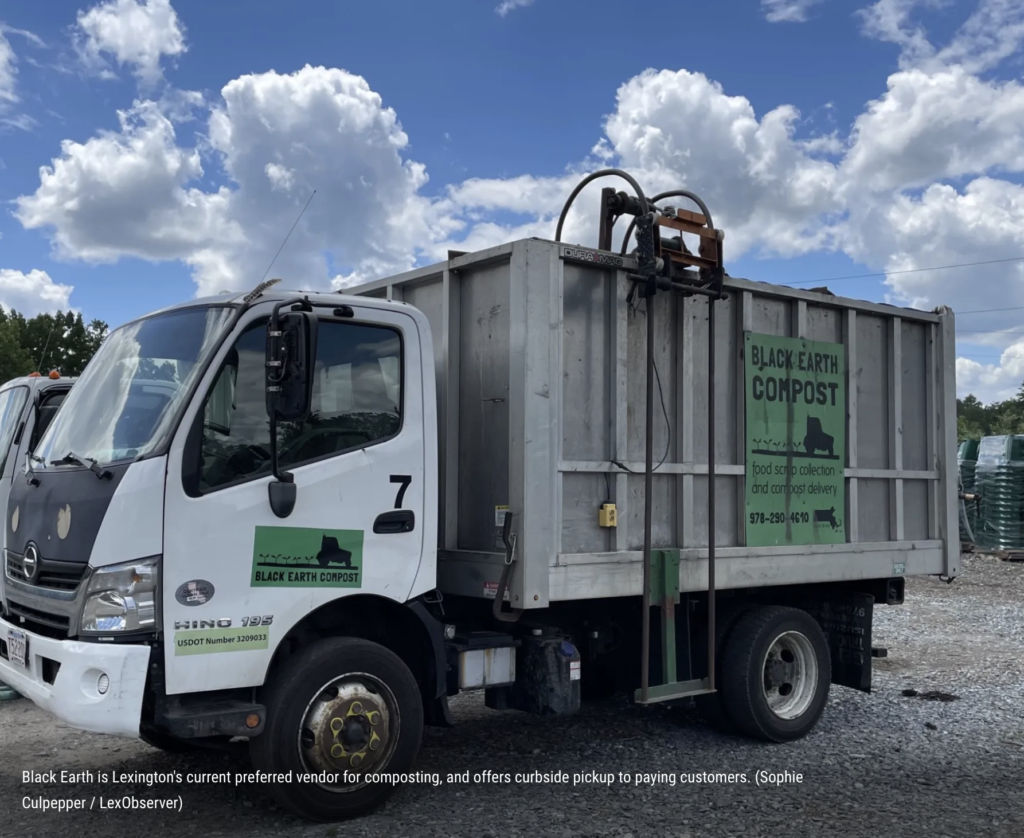
The following article, Many Residents Want To Bring Town-wide Composting to Lexington. What Could That Look Like by Sophie Culpepper appeared in the Lexington Observer on June 30, 2022. It is reposted here with permission. This story updated on July 15, 2022 at 12:51 p.m. after the Boston Globe reported about compost PFAS contamination at a different facility in Massachusetts. Comments were added in “The view from the state level.”
In late May, members of Lexington Public Schools Green Teams began to circulate a petition to gauge and demonstrate support for town-wide curbside composting. At press time, they’ve gathered about 780 signatures from individuals and community groups. They hope to collect a few thousand more online and in person by the end of the summer, simultaneously raising awareness about the importance of composting; they emphasize that collecting signatures is intended to be a supportive, rather than confrontational, effort with the Town.
About 20% of Lexington households currently compost, according to the petitioners. The leap to 100% would likely be a years-long undertaking involving waste contract(s), the Town budget process and substantial resident education. But with the Town’s current waste contract set to expire in a year and the FY24 budget-setting process about to begin, it’s a leap that local activists, Town staff, and Town officials are contemplating in earnest.
While it’s too early for consensus on key questions such as who the provider would be, whether the Town would have on-site food waste composting, how quickly this could be achieved and how much such a program would cost – or save – Town officials, staff and advocates generally agree on one thing: Lexington needs to move in this direction.
How Do Lexington Residents Compost Today?
Lexingtonians currently have three primary options for residential composting: Paying a private company for curbside pickup, a free drop-off program called LexSORT and good old-fashioned backyard composting. (The Town offers short video tutorials for curbside composting and backyard composting.)
About 1,100 households currently pay Black Earth, the Town’s preferred vendor, to pick up and process their compost. Residents can pay about $100 a year for weekly pickups or $75 for pickups every two weeks, a slightly discounted service due to the critical mass of customers in town. Residents also receive a complimentary bag of compost in the spring.
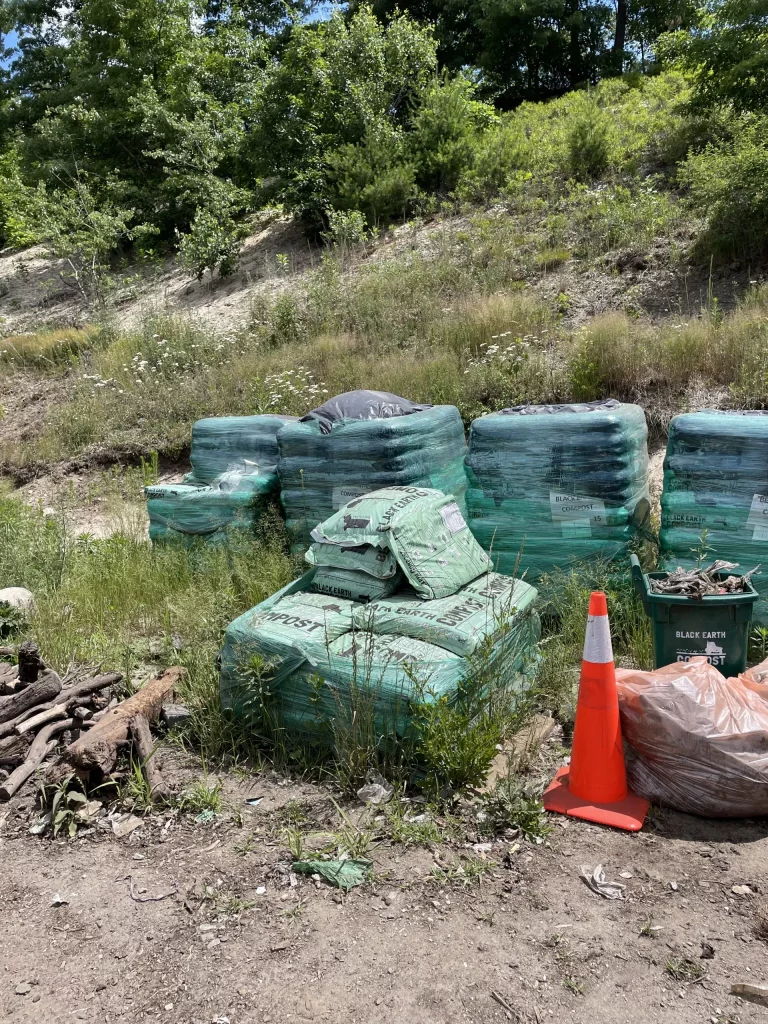
The company has been picking up compost in town for about five years, according to founder Conor Miller. Participation “is around 10%, which is pretty good” for a program that isn’t town-funded, he said. He credited Lexington moms as the movers and shakers who brought Black Earth to town: “Lexington has the best parents for organizing,” he said.
Customers value the service they receive from Black Earth. Select Board member and Zero Waste Task Force liaison Joe Pato has been a customer for a couple years. “It really reduced the volume of trash that I was generating significantly,” he said.
Ricki Pappo, chair of Lexington Climate Action Now (LexCAN), is also a loyal customer. “Making compost from food waste is the absolute epitome of what recycling should be,” she said. Vice Chair Marcia Gens agreed: In the world of climate action, composting is “one of the rare things…that is a solution that’s win-win-win.”
Still, not everyone wants to pay to compost. LexSORT, a dropoff pilot program first established last fall, has provided a free alternative to a little over 300 families, according to the co-president and co-founder of nonprofit LexZeroWaste Collaborative, Hien Nguyen. Compost deposited at one of the two dropoff bins is picked up by Black Earth – but the consolidated bins facilitate a cheaper operation than individual curbside pickup. LexSORT was initially grant-funded and is now paid for by the Town.
According to Nguyen, who is a longtime backyard composter, LexSORT brought novice composters into the fold. “More than 50% of the people who enrolled were composting for the very first time…It dispelled this misperception that composting was somehow difficult,” she said, noting that providing starting kits to participants was “really, really helpful.” Cost appeared to have been a barrier to composting previously among many of those LexSORT reached, Nguyen said.
In a survey conducted after the first six-month LexSORT pilot, composters reported reducing their remaining trash by 25% to 75%, she added.
Another benefit: LexSORT donates some of its compost to the local Interfaith Garden, where produce for the Lexington Food Pantry is grown.
That said, this model has some inherent drawbacks – participation requires owning a car or living within walking distance, and, like backyard composting, the dropoff program cannot accommodate certain organic waste accepted for commercial composting such as dairy, meat and bones (as these can attract pests).
Making compost from food waste is the absolute epitome of what recycling should be.
RICKI PAPPO, LEXCAN CHAIR
LexZeroWaste, and Nguyen, are signatories along with LexCAN. “I think that we could reach the majority of households in town by implementing a curbside organic waste pickup program,” Nguyen said.
Lexington Public Schools has been at the forefront of local composting – part of the reason the sign-on initiative originated with this group.
“You just tell the kids and they get it,” LPS Green Teams Core Member Cindy Arens said of elementary school students composting. “There’s a little bit more of a barrier, I think, with adults, maybe just because…it’s harder to change the way you think.”
Why Go Townwide Now?
Demonstrating support for town-wide curbside composting is important now, according to Arens and fellow Green Teams Member Diane Pursley, because Town staff can take that support into account as they develop projects to be funded in the Fiscal Year 2024 Town budget, a process that begins this fall. Additionally, the petition notes that Lexington’s current waste hauling contract will expire in June 2023, creating an opportunity for composting to be factored into the next waste hauling contract.
Arens and Pursley want the program to be considered in budget decision-making as early as possible. “The budgeting cycle was really the impetus,” Pursley said. “We know that there’s a long lead time, so we felt some urgency to kind of get the conversation [going].”
The Town identified the goal of “adoption of curbside composting programs” as early as 2018, in its Sustainable Action Plan. More recently, Arens cited Town Meeting’s Zero Waste Resolution, a non-binding resolution that was approved in April with 170 votes yes, 4 no and 8 abstentions. The overwhelming support for the resolution, which explicitly noted that food waste constitutes “25%, and thus the biggest component, of residential waste” and resolved to “plan for town-wide compost services,” suggested that there is widespread support for measures such as townwide curbside composting, she explained.
They hope gathering signatures will help create the momentum for a budget request this fall for FY24, which begins July 1, 2023.
A townwide curbside composting project would fall under the purview of Public Works Director Dave Pinsonneault and Environmental Services Superintendent Robert Beaudoin, who are also members of the Town’s Zero Waste Task Force with Arens and Pursley.
Pinsonneault agrees that townwide composting is where Lexington needs to go. “Although it’s not a mandate yet from the state…it’s eventually going to be there. And Lexington has always kind of been at the forefront of things.”
Beaudoin credited residents with “making [composting] a priority” for the Town.
The Town will likely determine the new waste contract within the next six months, well in advance of next year’s expiration. This summer, “what we want to do before that is really vet all of the different possibilities that are out there…in terms of vendors and how that would occur. And then see what we can come up with that’s going to be the best fit for Lexington,” Pinsonneault said.
A townwide curbside composting program could take a few different forms. It could fall under the Town’s new waste removal contract, as a service along with removing trash and recycling – or, the Town could authorize a separate contract, with Black Earth or another company.
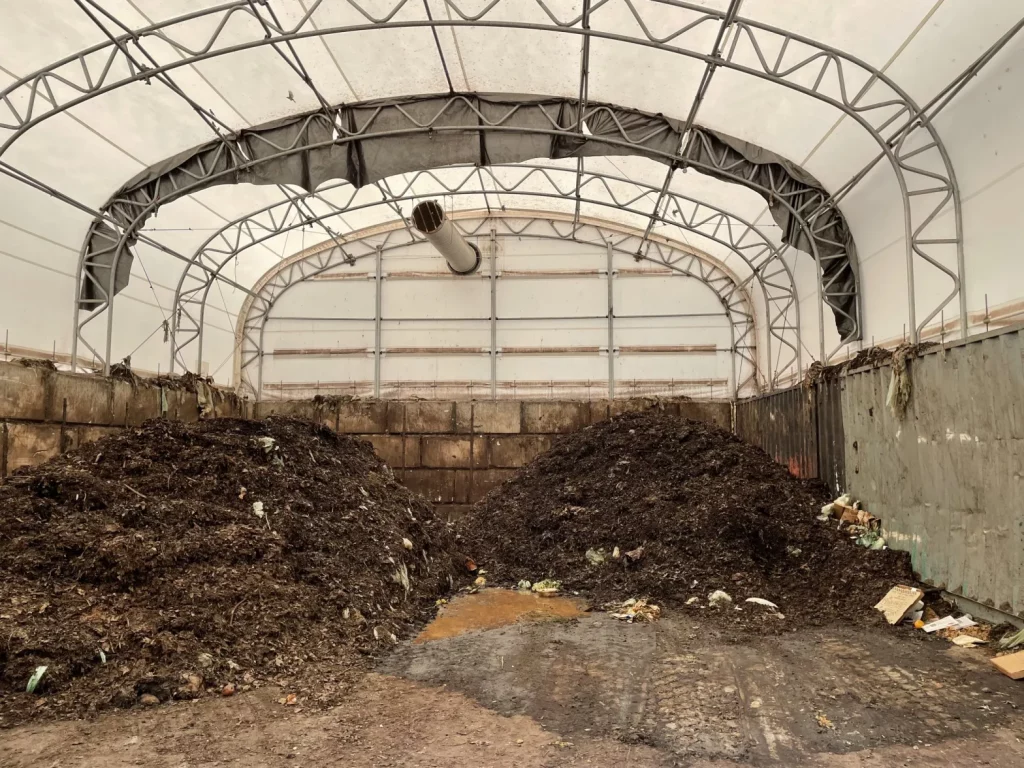
To make these decisions, the Town will have to determine whether its current waste contractor could provide food waste disposal, and whether another contractor could provide better service, among other considerations. The Town would seriously consider multiple options for partnering with Black Earth, but this would not be a guarantee.
The existing composting programs in town have functioned as pilots of sorts, so Lexington might be able to make the leap to funding a townwide program in FY24 – but also might choose to fund a larger pilot in the first year, Pinsonneault said.
If the Town were to take the second route, Pato personally believes it would be important to have a transition plan in place before the next waste contract renewal in about five years. “Waiting another five-year cycle, I think, is really way too long,” he said.
Regardless of what form townwide curbside composting takes, Pinsonneault synthesizes the main challenge he believes it would pose in a single word: “Cost.” On the state level, Department of Environmental Protections Press Secretary Ed Coletta agreed, identifying “expense” as the greatest challenge to this undertaking for municipalities across Massachusetts.
Proponents of town-wide curbside composting argue that composting should reduce costs by diverting so much waste from trash. Trash pickups could occur less frequently while still meeting resident needs, lowering hauling costs and tipping fees paid at landfills or incinerators.
For FY23, the Town’s operating budget for refuse collection is just over $1 million, a 3% increase, whereas recycling expenses decreased. The second expense, or “Refuse Disposal” cost, is $789,925 – “an increase of $40,903 or 5.46%, attributable to a 3.24% or $2.61 increase in the Town’s tipping fee per ton.” The FY23 budget also notes that total refuse disposal is projected to be 9,500 tons, a 200-ton increase “due to higher usage while residents have been home during the pandemic.”
Pursley, and many other petition signatories, believe that with tipping fees already on the rise, “there’s a business case” for developing townwide curbside composting.
Nguyen agreed. “I want people to consider the fact that right now, we are paying over a million dollars a year to burn food waste,” she said. “We as a town need to transition from paying for people to do the wrong thing and instead pay for them to do the right thing.”
This may prove true in years to come, Pinsonneault said – but at least in year one, he does not believe townwide composting can be funded by savings on trash pickup. “Until Lexington goes through a year or two of that process, we won’t know what that actual potential cost savings could be,” he said.
Even if it were possible to make the service cost-neutral in the budget, costs for the composting bins, which the Town currently provides discounted or free to residents thanks to state grant funding, would add up. “The grants that we get…are not going to cover 11,000 households,” Pinsonneault said. “There’s going to be some cost somewhere in the mix.”
We as a town need to transition from paying for people to do the wrong thing and instead pay for them to do the right thing.
HIEN NGUYEN, LEXINGTON ZERO WASTE COLLABORATIVE CO-FOUNDER AND CO-PRESIDENT
In Pato’s view, the biggest hurdle to town-wide composting may be education, not cost: For instance, people expect compost to be icky and smelly, and don’t realize that sending food down sink disposals takes energy, he said. “It’s an education process to get people to realize it’s not hard.”
Historically, he added, “the community has been fairly loud in talking about what things they like about trash and what things that are not going to accept.”
Pato wants people to understand that municipalities move slowly, and they should not lose momentum over the months or years it takes to accomplish this goal.
“The bottom line is we’re committed to bringing this forward,” Pinsonneault said. “But it’s going to be a process.”
A Local Site For Food Waste?
Another consideration for the DPW to factor into any eventual proposal for town-wide curbside composting: Would food waste stay in town, or be processed elsewhere?
Currently, Lexington compost picked up by Black Earth ends up at a facility in Groton, about 40 minutes away. But the company would like to use a small portion of Lexington’s existing site for yard waste compost for food waste composting.
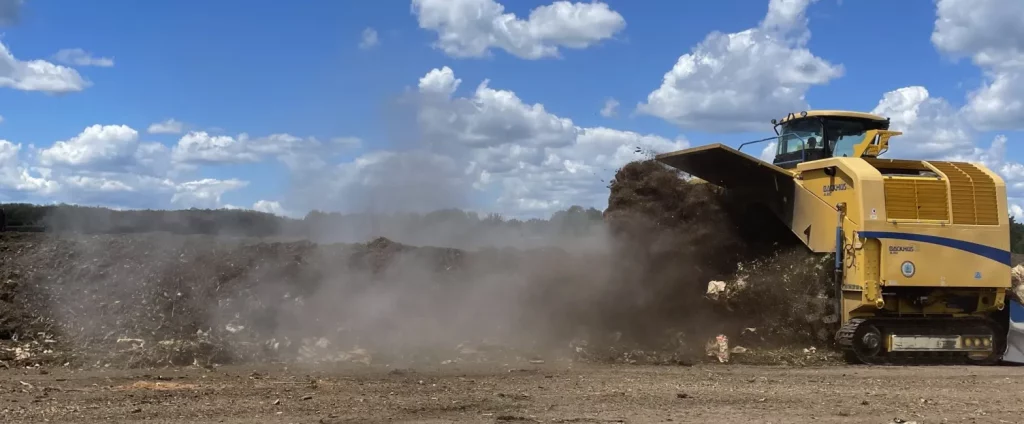
In late May, Black Earth presented its proposal for a regional food waste disposal facility at 60 Hartwell Ave. to the Sustainable Lexington Committee. The company would use one to two acres out of the roughly 26 acres comprising the facility for this purpose. If this were to function as a regional facility, with about a 3-1 ratio of other towns disposing their waste alongside Lexington’s, partner and compost manager Andrew Brousseau said Black Earth might offer town-wide curbside composting to Lexington at no cost.
Environmental Superintendent Beaudoin saw a lot of good in Black Earth’s early proposal, but he also identified some challenges. For instance, the 26 acres are already jam-packed during peak yard waste seasons of spring and fall. The Town currently sells out of the landscaping products it makes, he added, so cutting something out of existing operations to create space for food waste could have drawbacks.
Gaining a state permit for food waste disposal is no easy task either, he added.
The View From The State Level
State Rep. Michelle Ciccolo (D-15th Middlesex) co-founded the Zero Waste Caucus in early 2020. “It felt to me…that the legislature had been doing an awful lot of work on…clean energy and broader environmental issues and on toxic chemicals and different things, but that we didn’t really have much of a focus on waste at the time,” she explained.
She “absolutely” supports prioritizing townwide curbside composting. She also echoed predictions that developing such a program could ultimately save the Town money.
Ciccolo applauded the efforts of Town activists to gain support for town-wide composting, crediting grassroots activism with motivating her to form the caucus in the first place. “When we get state action, it’s because there’s been a number of people in different communities doing local action,” she said. “It is a symbiotic relationship, and a really important one.”
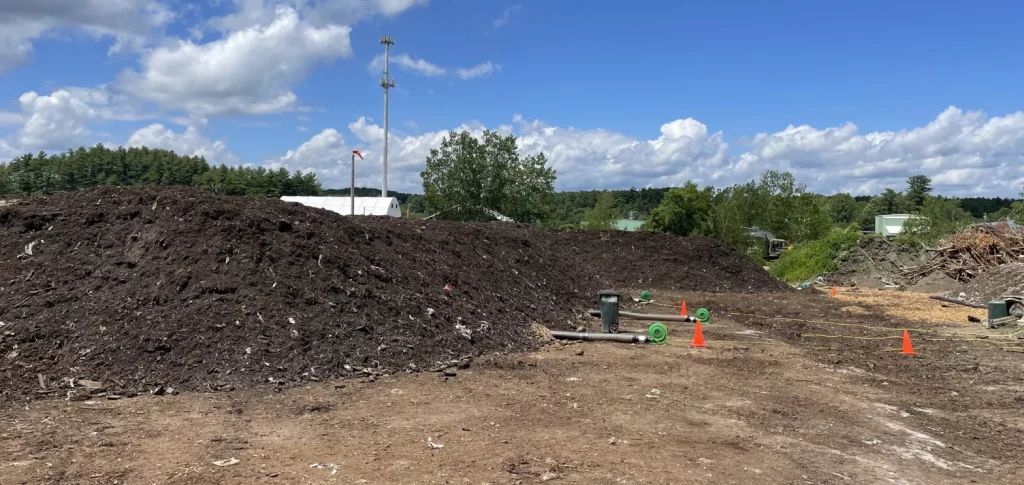
The state Department of Environmental Protection (DEP) developed a Solid Waste Master Plan to dictate measures for waste reduction between 2020 and 2030. Food waste is a major priority: By 2030, the plan calls for reducing the disposal of “food and other organic materials by an additional 500,000 tons annually.”
“Food waste is a top priority for MassDEP as it is [the] single largest segment of what’s disposed [of] in landfills and incinerators in the Commonwealth,” Press Secretary Coletta wrote.
The plan prioritizes composting for larger commercial and institutional waste generators; MassDEP has banned commercial institutions with more than one ton of organic waste per week from disposal since 2014. In November, generators of ½ a ton of waste per week, classified as “medium” waste generators, will be banned from throwing away organic waste and will be required to compost.
The plan calls for “conducting a stakeholder process by 2025 to assess whether to ban all organic waste from disposal by 2030” but does not commit to such a ban. “Relative to residential food waste, our plan calls for working with cities and towns on a voluntary basis on a range of approaches,” Coletta wrote
The plan points to the importance of education and supporting curbside and drop-off composting programs in communities and at community gardens. The Organics Action Plan, published in January, calls for offering grants to support organics collections from residential sources.
MassDEP has observed growth in both food drop-off and in independent subscription curbside composting vendors across the Commonwealth.
Beaudoin sees moves by cities such as Boston toward town-wide composting as significant. “A big leader like that…when they make a market change, you’re going to see more infrastructure develop.”
But recent findings about one commercial composting facility, Massachusetts Natural Fertilizer Co., demonstrate the critical importance of conducting large-scale composting carefully. On July 6, the Boston Globe reported that immense quantities of toxic per- and polyfluoroalkyl substances – long-lasting chemicals better known as PFAS – contaminated Mass Natural’s water and many of its compost products. This contamination was “most likely” the cause of severely tainted drinking water in as many as 200+ nearby properties.
Black Earth explains the measures it takes to prevent PFAS or other contamination in a statement on its website. Pure ingredients – such as food scraps – are key to clean compost: That means Black Earth “does not manage or process any type of water treatment sludge or paper mill waste,” the two materials identified as possible sources of PFAS compost contamination in the case of Mass Natural.
In addition to personally quality-controlling compost ingredients from the beginning of the collection process, Black Earth has its compost tested at the University of Maine each year, and those results are posted online showing that its compost meets Massachusetts’ strictest use standard. Black Earth doesn’t even allow grass into its compost because it can be treated with chemical fertilizers. “We make compost for our own kids to eat food from the gardens,” Miller wrote in an email.
Beaudoin wrote that pure ingredients are key to clean compost at Lexington’s Hartwell facility as well. “We primarily compost leaf and yard waste matter and woody materials such as brush,” he wrote. Additionally, the Town tests “screened compost at Hartwell for maturity, organic matter, and a variety of other chemicals such as potassium, nitrogen and other characteristics such as PH levels and carbon to nitrogen ratio.” Still, “PFAS is [an] issue of concern to all composters,” he added.
It’s an issue that will need to be confronted statewide, because large-scale composting is likely to become increasingly necessary in the coming years. Several activists in Lexington see the writing on the wall: As landfills fill up and close, they predict the state will prohibit residential organic waste disposal, even if the current focus remains on commercial regulation.
Pato hopes that Lexington can be one of the communities to prove that townwide curbside composting is a practical decision, leading others to follow suit.
“There’s arguments that, ‘well, we’re just one community; it doesn’t matter,’” Pato said. “If every community chooses the ‘it doesn’t matter’ response…it won’t change.”
